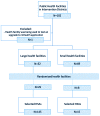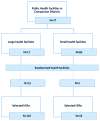A mixed-methods quasi-experimental evaluation of a mobile health application and quality of care in the integrated community case management program in Malawi
- PMID: 31263554
- PMCID: PMC6594718
- DOI: 10.7189/jogh.09.010811
A mixed-methods quasi-experimental evaluation of a mobile health application and quality of care in the integrated community case management program in Malawi
Abstract
Background: The use of mobile health (mHealth) technology to improve quality of care (QoC) has increased over the last decade; limited evidence exists to espouse mHealth as a decision support tool, especially at the community level. This study presents evaluation findings of using a mobile application for integrated community case management (iCCM) by Malawi's health surveillance assistants (HSAs) in four pilot districts to deliver lifesaving services for children.
Methods: A quasi-experimental study design compared adherence to iCCM guidelines between HSAs using mobile application (n = 137) and paper-based tools (n = 113), supplemented with 47 key informant interviews on perceptions about QoC and sustainability of iCCM mobile application. The first four sick children presenting to each HSA for an initial consultation of an illness episode were observed by a Ministry of Health iCCM trainer for assessment, classification, and treatment. Results were compared using logistic regression, controlling for child-, HSA-, and district-level characteristics, with Holm-Bonferroni-adjusted significance levels for multiple comparison.
Results: HSAs using the application tended to assess sick children according to iCCM guidelines more often than HSAs using paper-based tools for cough (adjusted proportion, 98% vs 91%; P < 0.01) and five physical danger signs - chest in-drawing; alertness; palmar pallor; malnourishment; oedema (80% vs 62%; P < 0.01), but not for fever (97% vs 93%; P = 0.06), diarrhoea (94% vs 87%; P = 0.03), and three danger signs - not able to eat or drink; vomits everything; has convulsions (88% vs 79%; P = 0.01). Across illnesses and danger signs, 81% of HSAs using the application correctly classified sick children, compared to 58% of HSAs using paper-based tools (P < 0.01). No differences existed for their treatment (P = 0.27). Interview respondents corroborated these findings that using iCCM mobile application ensures protocol adherence. Respondents noted barriers to its consistent and wide use including hardware problems and limited resources.
Conclusion: Generally, the mobile application is a promising tool for improving adherence to the iCCM protocol for assessing sick children and classifying illness by HSAs. Limited effects on treatments and inconsistent use suggest the need for more studies on mHealth to improve QoC at community level.
Figures



References
-
- World Health Organization, United Nations International Children’s Emergency Fund. Joint Statement: Integrated Community Case Management. New York, NY: UNICEF: 2012.
-
- World Health Organization. Integrated Management of Childhood Illness: Chart Booklet. Switzerland: World Health Organization, 2014.
-
- Najjemba R, Kiapi L, Demissie SD, Gossaye T, Engida M, Ratnayake R, et al. Integrated community case management: quality of care and adherence to medication in Beneshangul-Gumuz Region, Ethiopia. Ethiop Med J. 2014;52 Suppl 3:83-90. - PubMed
MeSH terms
LinkOut - more resources
Full Text Sources
Medical
